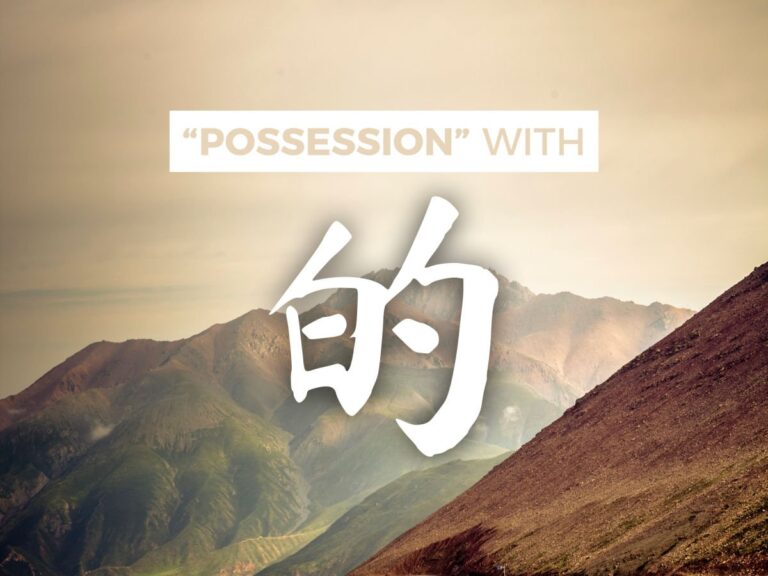Chinese Particles – Possession Particle 的

About “Helpers”
Linguists would call 的 a “Particle,” which is about the least useful term we can imagine for conceptualizing what this type of word does. However, the Chinese name for ‘particle’ is ‘助词 zhùcí – ‘help word.’ It’s for this reason that we refer to Chinese particles like “了,” “着,” or “的” as “Helpers.”
In The Mandarin Blueprint Method video course, all sentences that contain a helper will have the tag “GW-Helper.”
Chinese Particle 的 – Sentence 1:
我的儿子吓呆了。 – Level 13
Wǒde érzi xià dāi le.
My son was scared senseless.
Easy peasy! 的 particle connects 我 & 儿子 to indicate the son belongs to ‘我.’ As a side note, the ‘host’ of the sentence (which linguists call a ‘subject’ or ‘主语 zhǔyǔ’) is 我的儿子.
Sentence 2:
我早上骂了我的儿子。 – Level 13
Wǒ zǎoshang mà le wǒde érzi.
I scolded my son this morning.
Here we have the same point of possession (我的儿子), but instead of being the ‘host’ (subject 主语 zhǔyǔ), it’s the ‘guest’ (object 宾语 bīnyǔ).
Chinese Particle 的- Sentence 3:
我明白你说的话。 – Level 13
Wǒ míngbai nǐ shuō de huà.
I understand what you said.
This one is a bit more abstract because what “你” is possessing is “话 – words.” It’s taken to an even more specific level by saying, “你*说*的话.” This way, you know that it’s precisely the spoken words (as opposed to written).
Sentence 4 (and Variations):
桌子上的勺子是你的吗?
Zhuōzi shàng de sháozi shì nǐde ma?
Is the spoon on the table yours?
Here we see the 的 particle creating a possession relationship between a table-top and the object on it. We don’t say “the tabletop’s spoon” in English, but you’ll see this happen in Chinese all the time. Here are some more examples to illustrate this point:
桌子上的杯子是你的吗?
Zhuōzi shàng de bēizi shì nǐde ma?
Is the glass on the table yours?
桌子上的笔记本是你的吗?
Zhuōzi shàng de bǐjìběn shì nǐde ma?
Is the notebook on the table yours?
桌子下的东西请打扫打扫。
Zhūozi xià de dōngxi qǐng dǎsǎo dǎsǎo.
Please clean up the things under the table.
As a final point, you’ll notice that the second “的” particle doesn’t have any object after it. That’s because the object the speaker is referring to is still the 勺子, so there’s no need to repeat it twice:
桌子上的勺子是你(勺子)的吗?
Zhuōzi shàng de sháozi shì nǐde (sháozi) ma?
Is the spoon on the table your spoon?
You can find more examples here.
Possession Particle-的-Omitted-助词-的-的字省略

We’ve already discussed how to use the particle “的“ to indicate possession, and this grammar point merely notes that you can omit the particle “的“ if the context is clear.
Sentence 1:
我太太不来了。- Level 15
Wǒ tàitai bù lái le.
My wife is not coming now.
Where was the particle 的 omitted? We bet it didn’t take you long to realize it was excluded from “我的太太.”
This goes to show that the particle 的 often gets omitted when the relationship between the possessor and possessed is highly intimate. In this case, it’s a family relationship. Here are some other examples:
我妈 wǒ mā – My mom
你姐 nǐ jiě – Your older sister
她老公 tā lǎogōng – Her husband
Another intimate relationship is between someone and their home (家 jiā). That’s why you’ll hear people say “我家 wǒ jiā – My home” all the time.
Chinese Particle 的 omitted – Sentence 2:
你运气太好了! – Level 16
Nǐ yùnqì tài hǎo le!
You have such good luck!
If someone is commenting on how lucky you are, it’s understandable why they might omit the particle 的 because the relationship between oneself and luck is highly intimate. You can only have your own luck, not someone else’s.
Sentence 3:
他内心很矛盾。 – Level 17
Tā nèixīn hěn máodùn.
He’s very conflicted internally.
内心 means “heart; innermost being.” Talk about an intimate relationship!
We want to emphasize that with ANY of these sentences that omit the particle 的, it is not wrong to add 的 when speaking. 我的妈妈,我的家,我的内心, etc., are all perfectly fine to use.
Grammar Rules ≠ Grammar Acquisition
We hope you’ll find these grammar lessons helpful, but please bear in mind that you will naturally acquire grammar by reading the content you understand. This is how you acquired your native language, and your brain hasn’t fundamentally changed how it achieves fluency between then and now.
Sure, as adults, we can conceptualize abstract grammar rules and answer the question, “why is [X] structured this way?” but it doesn’t directly help you acquire the language. THAT’S WHY THESE ARE BONUS LESSONS. At best, grammar points to aid in your noticing patterns, but that’s it. They don’t TEACH the pattern.








